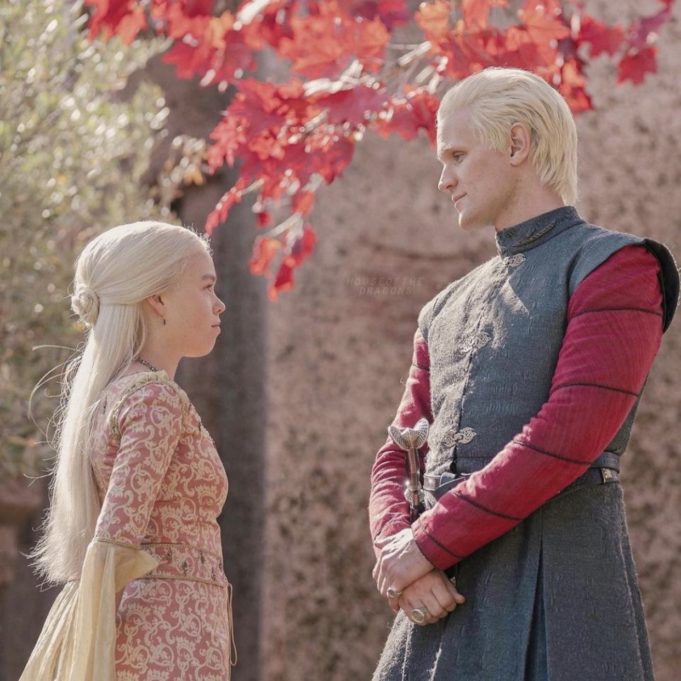There’s a point in “King of the Narrow Sea,” the fourth episode of House of the Dragon, in which Rhaenyra (Milly Alcock) is confronted with the ugliest truth of her world: Her half-brother Aegon, a toddler, curries more favor with the hoi polloi as the future ruler of Westeros simply because “Aegon, the babe” is a male and she is not.
She hears this in a back-alley mummer’s play about the succession, during an incognito jaunt outside of the Red Keep with her uncle, Prince Daemon (Matt Smith), in what seems like a trip through Fantasy Bourbon Street during Fantasy Mardi Gras.
Though their night out amid the unwashed masses leads to a far more important narrative vector, the reality of her gender’s circumscription is a thread woven inextricably into the larger story of how and why the realm falls into eventual civil war.
The limits placed upon Rhaenyra’s agency exist because women in Westeros are second-class citizens. If the show’s creators are trying to make a point about contemporary society, the arbitrary cruelty inherent in treating women as the second, less-important sex seems to be it. Frankly, they can’t hammer this message home hard enough, though not for lack of trying. Rhaenyra is well aware that her baby brother’s penis is unfortunately what matters more than her brain and experience to the people she would rule. She is aware that she ultimately cannot escape political matrimony, for in this episode, after spurning a succession of some 40 suitors, she finally relents and agrees to marry Laenor Velaryon (Theo Nate), but she is not the only woman to feel the walls of Westerosi gender traditions.
Rhaenyra’s sexual awakening occurs in this episode — and in contrast to House of the Dragon’s predecessor, Game of Thrones, it is at least consensual though still lurid and shrouded in taboo — but best friend and queen Alicent (Emily Carey) is already a mother of two, for whom sex is but the first phase of a royal chore that lasts until she can no longer birth children. Rhaenyra at least gets to see how the other side does it. Daemon takes her to a pleasure house to illustrate that people fuck for other reasons than to perpetuate a dynasty, and, by the end of it, she forgoes royal propriety in favor of the smoldering desire that she and her uncle have shared for years.
Daemon presses his niece against the wall, much to her fervent delight. Shot against a gauzy backdrop of orgiastic revelers, Rhaenyra looks like she’s caught up in a steamy lucid dream. Yet this scene is intercut with Alicent in her own bed, eyes open, face expressionless, lying compliant beneath the earnest, for-gods-and-country thrusting of her kingly husband (Paddy Considine). We get a shot of the mottled sores of Viserys’ back but hear Daemon’s voiceover: “Marriage is a duty, but that doesn’t stop us from doing what we want and fucking who we want.”
Yet even Rhaenyra’s eye-opening “what happens in Flea Bottom, stays in Flea Bottom” evening ends up being as disappointing as Alicent’s because Daemon, for whatever reason, rebuffs her advances, leaving her thoroughly unsatisfied, hung out to dry against a wall in a brothel. Is this yet another instance of the prince’s boner problems, or is he not following through out of guilt for the inevitable, salacious consequences of coupling with his niece in the company of a bunch of horny strangers who may or may not be informants? We learn the truth of this a few scenes later but not before Rhaenyra returns to her room and seduces bodyguard Ser Criston Cole (Fabien Frankel).
Besides the actual awkwardness of trying to undress a person clad in full-plate armor, we learn this about Rhaenyra: That line her uncle served her about fucking who we want did not fall on deaf ears. She wanted Ser Criston, and that was that. What’s kind of heartbreaking in this scene is the look on his face as he succumbs to temptation and removes the white cloak of the Kingsguard, the symbol of his own virtue and achievement. Everyone faces a Rubicon to cross in this show, but once Ser Criston is on the other side of his own, his compunction for cheating on his vows is forgotten the instant he and the princess are naked.
Daemon wakes up hungover on a mattress in Flea Bottom. Mysaria (Sonoya Mizuno) is there to offer him perfunctory care and a hefty dose of realpolitik, since she is herself working for Otto Hightower (Rhys Ifans) — the Hand later refers to her as an informant called “The White Worm” — because she can’t count on the prince to keep her safe and cared for. Then the Kingsguard comes for Daemon, and the prince’s plans are laid bare on the floor of the throne room when Viserys tries to kick the truth out of him. It’s a stark contrast to the episode’s opening, when Daemon returned to King’s Landing from the Stepstones as the self-styled driftwood-crowned King of the Narrow Sea to bend his knee to his brother and reenter the king’s good graces. In that scene, they embrace to the applause of the entire court, but here, it is just the two of them, and while Daemon submits again to Viserys’ official capacity for violence, he refuses to deny the events of the previous night, which Viserys learned in the wee hours of the morning from a late-night call by Otto. Daemon, betting that a publicly sullied Rhaenyra would force Viserys to make her marry him/Daemon, did not count on Viserys still caring that Daemon is still married to Rhea Royce of the Vale, nor did the prince expect the king to be so horrified. But horrified Viserys is, and he banishes Daemon forever.
Alicent, having eavesdropped on Otto and her husband, is also horrified. She summons Rhaenyra in secret to ask for the truth herself. Rhaenyra lies at first, then offers an abridged version, in which she went out for drinks with her uncle, who then dragged her to a strip club. Since he was her escort, what else was she supposed to do? And that’s all that happened. Rhaenyra swears by this, and while Alicent, effecting a TV-character piety on par with Freaks and Geeks’ Millie Kentner, is not exactly likeable for her role in the Targaryen family drama, neither is Rhaenyra. Nobody likes watching a teller of bald-faced lies. Yet she and Alicent make a peace of sorts.
By the end of the hour, Viserys has made his own peace, this time with his heir Rhaenyra, and in doing so, he has mollified his other political headaches by banishing his brother, getting his daughter’s commitment to marry Laenor Velaryon, reminding her (via a pyromanced message from Aegon, the Conqueror, written on the blade of his Valyrian dagger) of the “Song of Ice and Fire” prophecy, and firing Otto Hightower, Rhaenyra’s one condition for doing what her father asks. And in a final act of absolute authority for the good of the realm, he sends a maester to Rhaenyra with a pot of moon tea, the Westerosi version of Plan B.
But for all his attempts at control, Viserys cannot contain chaos. Though he may have stopped his daughter from having an ill-begotten child, it is the ones from the marriage he sanctioned that will further rattle the realm’s shaky foundation.












